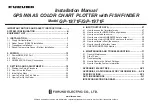
ENGLISH
ENGLISH
5. Press the MENU button to enter the desired frequency, as shown in Figure 15.
SAVE? will appear on the display, followed by “+ YES – NO”. Press the “+” button
to save the new frequency, or press the “–” button to return to the original setting.
See Figure 20.
FIGURE 20
Changing Receiver Name
To identify a particular transmitter with a receiver channel, set the name of the receiver
as follows:
1. Press the MENU button. The + MENU – display will appear, as shown in Figure 21.
FIGURE 21
2. Press either the + or – button to reach the SET NAME display, shown in Figure 22.
FIGURE 22
3. Press the SELECT button. An underline will appear under the first character of the
name. The factory pre–set Name display (SHURE) is shown in Figure 23.
FIGURE 23
4. Press either the + or – button to scroll through the character options (A–Z, 1–9,
etc.) until a desired character is reached.
5. Press the SELECT button to enter the character and move to the next space. You
may enter a name up to eight characters long, including blank spaces. Continue
until you have spelled out the entire name.
6. When the new name has been completely entered, press the MENU button.
“SAVE?” will appear, followed by “+ YES – NO”. Press the “+” button to save the
new name and return to the Group/Channel/TV display. Press the “–” button to
make more changes. See Figure 24.
FIGURE 24
NOTE: If more than 20 seconds of inactivity elapse, the display will return to the
original settings.
Changing Receiver Squelch Level Setting
Higher squelch settings will demand a quieter signal before muting the receiver,
but reduce operating range. Lower squelch settings will extend the operating range,
but increase noise levels before dropout occurs. To change the receiver Squelch set-
ting, proceed as follows:
1. Press the MENU button. The + MENU – display will appear, as shown in Figure 25.
FIGURE 25
2. Press either the + or – button to reach the SET SQCH display, shown in Figure 26.
FIGURE 26
3. Press the SELECT button to display the current squelch level, as shown in Figure
27 (factory preset value is “0.0”).
FIGURE 27
MID
4. Press either the “+” or “–” button to change the Squelch setting in increments of
0.5 until the desired level is reached. The Squelch setting actually changes the
moment you press the “+” and “–” buttons.
16
17





































